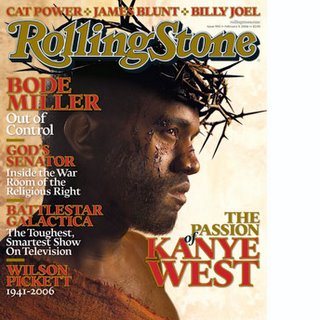
OK
I got an email from somebody I don’t know, who has never walked into our spiritual community, telling me that the way we use music in our community is wrong. Specifically the use of ‘secular’ music is wrong. So this got me thinking: No, not about ignorant people…that will be a different post (UGHH there goes that inside voice…)
Today celebrities serve as cultural prophets and religious philosophers. More often than not, a famous actor or actresses will have a great influence with their religious beliefs on the average person. Recently, Kanye West, after winning 3 Grammys and being on the cover of Rolling Stone as Jesus, said that if there were a "revised gospel" he should be in it . . . In his later 20’s, West is one of the most popular and polarizing artists in music today. And while he's sold more than 4 million albums to date, he is as known for his outspokenness as he is for his hit-making ability. Not only is he compelling, but also so ridiculously brash, and yet so irresistibly entertaining.
Celebrities like West find that since the media scrutinizes their lives and practices, their words are magnified to the general population. Leonard Sweet says, “The best way to defuse the principalities and powers of postmodern culture is not to escape from it, but to learn its language, master its media, and engage it on a higher level.” The church has failed to master the media. In his book Carpe Manana, Leonard Sweet’s message is that the church’s presentation, which consists of the medium, style and language, must be culturally driven in order to be relevant. The message does not change, but the medium and style must.
Marshall McLuhan is considered by many to be one of the chief theorists of mass communications in our time. A practical ramification of reading of McLuhan is that one first must notice and accept the fact that the world is rapidly changing with the advent of technology; and that means that the church must be aware of that change. Not only must the church be aware of it, it must be involved in it. As the world changes, the church must be willing to change as well. This change can happen in many different forms, but according to McLuhan, the form is not what is important. The church must remember that what is important is the message that we are trying to get across to the rest of the ‘global village,’ namely the gospel. We must not focus on the means or process, but rather on the substance of what we have to offer.
Almost certainly in today’s society one can observe that there it is a genuine openness to spirituality, and that this is all magnified with the utilization of media. But here lies the confusion. Famous celebrities who claim they are ‘Christian’ talk about God or Jesus while promoting a lifestyle that is directly opposed to Scripture and the very teachings of the God they say they serve. Celebrities want to thank God and Jesus from award podiums, but often the same artist has won the award for a song or movie that may demean women, promote violence or glorify sexual promiscuity. It is not uncommon to hear Christian terminology used by celebrities without grounding it in Scripture or in the person of Christ. With spiritual hunger and awareness on the rise, books about spirituality like Deepak Chopra’s Conversations With God are being promoted by television hosts such as Opra Winfrey, yet there is no Biblical foundation to any of this spiritualism. There are new definitions being allocated to established theological and spiritual terms by these new cultural prophets and teachers. Thus what one finds is that there are confusing messages being sent to the spiritually hungry emerging generations who are learning these theological terms and ideas, but have ended up defining Jesus very differently than the Bible does.
Thoughts?


